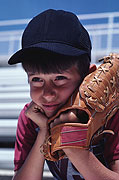
FRIDAY, March 9 (HealthDay News) — Parents who want to protect their kids from sexual abuse need to reassess the notion of “stranger danger” — the belief that children should be on guard around strangers because they’re most likely to be molested by someone unknown to them, experts say.
In truth, at least four of five cases of child sexual abuse are perpetrated by someone who knows the child, according to the American Academy of Pediatrics.
“Parents need to get away from that mythology and deal with the reality [that] if it’s going to happen, it’s going to be someone within your circle,” said Nancy McBride, national safety director for the National Center for Missing and Exploited Children. “It’s going to be somebody you know. I know it’s scary, but we need to come to grips with that.”
That reality was underscored in the past year by allegations of child sexual abuse against assistant coaches at Penn State and Syracuse universities, who were accused of using their positions to manipulate their victims — a scenario perhaps on the minds of parents and youngsters gearing up for spring and summer sports seasons and sports camps.
“The hardest idea for parents to embrace is that somebody in this position of trust and authority could be the ultimate betrayer of their children,” McBride said. “A creepy weirdo is so much easier for us to understand because we can put that person in a separate category.”
By understanding where the danger truly lies and by fostering a nurturing environment that promotes open communication, parents can best protect their children from sexual abuse, said McBride and Dr. Cindy Christian, who chairs the American Academy of Pediatrics’ committee on child abuse and neglect.
“You need to develop lines of communication with your children starting at a very young age, creating a household where children feel supported even if they have to discuss a difficult issue,” Christian said.
The two experts agreed that parents should be on guard against anyone who wants to spend an unusual amount of time with their children, particularly if the person makes promises or comes up with justifications.
“A coach says, ‘Your child really has potential. I can bring it out in him or her but I’ll need to spend more time with them,'” McBride said.
Another red flag is an adult who showers a child with gifts or spends lots of money on the child.
“If you’re thinking to yourself, why is this person so nice to my kid, then it’s time to start thinking about why that person is so nice to your kid,” Christian said.
Trustworthy adults who work with children will not take offense at a parent’s protectiveness. “Anybody who’s on the up and up is going to welcome scrutiny,” McBride said. “They’re going to welcome a background check. Look for that openness.”
Parents also can reduce their children’s risk by becoming involved in activities that put their kids under the supervision of other adults. “The more involved the parent or guardian is, the better off everyone is,” McBride said.
Children also need to feel free to speak to their parents about situations that made them feel scared or uncomfortable — and that’s where it’s important to build trust and open communication.
As part of that, parents must first get over any reluctance to talk about private body parts with their children, Christian said.
“Frequently, parents are so afraid of bringing up issues of sexuality that they don’t even give their very youngest children a name for the genitals,” she said. “If you treat that part of the body like all other parts of the body, it begins to open a dialogue so children can talk about them.”
By talking about these body parts, parents can then reinforce the notion that they are private. “One good approach is to tell your child that our private parts are the parts that are hidden under bathing suits,” Christian said. “Children can understand that. Those are our private parts, and you aren’t allowed to touch other people’s private parts, and they aren’t allowed to touch yours.”
Events like those alleged at Penn State and Syracuse can provide a valuable opportunity to bring up the topic. With school-age children, Christian said, “parents should use these news items around the dinner table to begin discussions of safety and what children should do if they ever felt unsafe.”
Once a dialogue has been opened, parents should discuss various situations that might indicate that a possible child molester is making advances. For example, a molester might offer candy or toys, offer money to run an errand, or take the child on special outings.
Children particularly need to be encouraged to come forward if a possible molester talks about some “special secret” they share, tries to make the child feel guilty or ashamed, or actually threatens to harm someone if the child talks to their parents.
“Children really shouldn’t have many secrets, if at all, from their parents,” Christian said. “It’s OK to tell your parents about anything, especially if someone has told you not to talk to your parents about something.”
When discussing these scenarios, the experts say it’s important to walk through what the child should do in response.
“Remember that kids learn through modeling behavior and through practicing,” McBride said. “Do some practice runs with them, using ‘what if’ scenarios. You’ve got to make sure your kids are getting it, and the only way to do that is through practice.”
And to avoid scaring your child during these discussions, she said, be sure to answer their questions matter-of-factly and honestly.
“It’s so important not to use fear as a motivator,” McBride said. “If you’re not enshrouding all this conversation in secrecy and mystery, you’re in a position where they are more likely to come to you if somebody’s done something to them that they are scared or confused about.”
More information
The American Academy of Child and Adolescent Psychiatry has more on
child sexual abuse.

